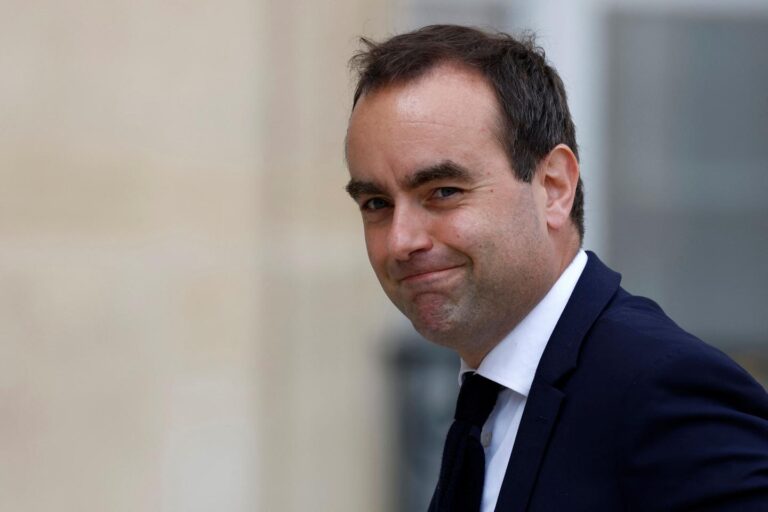In the tumultuous landscape of French politics, where divisions run deep and consensus is often elusive, President Emmanuel Macron has turned to a familiar figure to steer the ship of state through choppy waters. Sébastien Lecornu, Macron’s quietly effective power broker, has been tasked with the complex role of Prime Minister, a position that demands not only political acumen but also a deft hand in diplomacy. As Lecornu steps into this pivotal role amidst a backdrop of fractured alliances and rising populism, questions loom about his ability to unify a divided parliament and address the pressing challenges facing France. This article explores whether Lecornu’s unique blend of pragmatism and quiet influence can indeed navigate the intricacies of contemporary governance and restore stability to a nation in search of direction.
Understanding Sébastien Lecornu’s Role as a Strategic Mediator in French Politics
Sébastien Lecornu has emerged as a pivotal figure in shaping contemporary French governance, primarily through his intricate role as a strategic mediator amid the nation’s complex political landscape. His background as a former minister and a close ally of President Emmanuel Macron has equipped him with unique insights into the intricacies of coalition-building and negotiation. As a graduate of the prestigious Sciences Po, Lecornu is not only adept in the art of political maneuvering but also embodies a commitment to balancing diverse interests and rebuilding trust among fragmented factions within the government.
In navigating the challenges posed by a polarized political environment, Lecornu has been instrumental in fostering dialogue between various parties. His approach often emphasizes collaboration and consensus, key elements vital for effective governance. Some of his notable strategies include:
- Facilitating bipartisan discussions to address pressing issues such as economic recovery and climate change.
- Building alliances with smaller parties to ensure broader support for governmental initiatives.
- Engaging with civil society to incorporate public sentiment into policy formulation.
Assessing the Challenges of Political Fragmentation Facing France’s New Prime Minister
Political fragmentation presents a formidable challenge for France’s new Prime Minister. Sebastien Lecornu must navigate an increasingly divided political landscape where multiple factions vie for influence. The remnants of the once-dominant parties like the Republicans and Socialists struggle for relevance amid the surge of populism and far-right movements. This dynamic has resulted in a complex arena where coalition-building becomes imperative yet delicate. Key factors influencing this fragmentation include:
- Shifting Voter Loyalty: Electorates are more likely to switch allegiances, driven by issues such as migration and economic inequality.
- Rise of Extremist Parties: The presence of extreme left and right factions complicates the policymaking process.
- Declining Traditional Parties: Established parties face an identity crisis, impacting their ability to form oppositional coalitions.
To address these challenges, Lecornu will need to employ a blend of strategic diplomacy and flexible governance. His political background has equipped him with the skills for negotiation and consensus-building, which will be tested in this climate of discontent. Engaging in cross-party collaborations could prove vital in creating a stable governing framework. Essential considerations include:
| Strategies | Expected Outcomes |
|---|---|
| Building Coalitions | Greater legislative support |
| Engaging Minority Parties | Inclusivity in governance |
| Promoting Unity on Key Issues | Policy stability |
Key Strategies for Lecornu to Foster Unity Amidst Divided Political Landscape
Sébastien Lecornu’s approach to uniting a fragmented political scene hinges on a combination of collaboration and dialogue. To effectively bridge divides, he must prioritize engagement with both mainstream parties and fringe movements. Key strategies could include:
- Inclusive Roundtable Discussions: Establishing regular forums where representatives from various parties can express concerns and propose solutions in a neutral environment.
- Consensus-Building Initiatives: Focusing on common goals like economic recovery and social cohesion to foster alliances across party lines.
- Transparent Communication: Building trust through open channels where constituents can voice their opinions and receive clear feedback on government initiatives.
Additionally, Lecornu’s ability to harness technology can play a pivotal role in strengthening community ties. Emphasizing digital platforms for civic engagement allows for a more inclusive approach to governance. Strategies may encompass:
| Strategy | Description |
|---|---|
| Digital Town Halls | Interactive forums where citizens can discuss pressing issues directly with government officials. |
| Online Polling | Gathering public opinion on key decisions through accessible digital surveys. |
| Virtual Collaboration Platforms | Facilitating brainstorming sessions to solve urban and rural challenges collectively. |
Implications of Lecornu’s Leadership on France’s Domestic and International Agenda
Sébastien Lecornu’s ascension to the role of Prime Minister carries significant implications for France’s domestic landscape, particularly amid a backdrop of political fragmentation. Known for his strategic acumen, Lecornu aims to unite the diverse factions within parliament, fostering collaboration where discord has prevailed. His approach could lead to effective policymaking in crucial domains such as energy transition, social welfare, and economic recovery. According to analysts, his emphasis on dialogue may not only soothe internal tensions but also cultivate a more cohesive government that prioritizes stabilizing reforms over partisan bickering.
On the international front, Lecornu’s leadership is poised to redefine France’s diplomatic relationships, especially within the European Union. His background in defense and local governance positions him uniquely to address pressing global issues such as climate change, security challenges, and geopolitical alliances. Additionally, his connections with European leaders are expected to enhance France’s influence on the continent, potentially reshaping collaborative initiatives and fostering a more unified stance against rising global challenges. The interplay between Lecornu’s domestic strategies and international commitments could chart a new course for France that emphasizes both internal unity and external leadership.
In Summary
In conclusion, Sébastien Lecornu’s ascension as Prime Minister offers a fascinating glimpse into the dynamics of French politics, which are marked by deep divisions and challenges. As a strategist known for his subtle influence rather than overt displays of power, Lecornu faces the daunting task of uniting a fractured political landscape. With critical decisions on the horizon and rising public expectations, all eyes will be on him to see if his quiet diplomacy can reconcile differing factions and lead France toward stability. As the nation watches closely, Lecornu’s ability to navigate these tumultuous waters will undoubtedly shape the future of governance in France.




